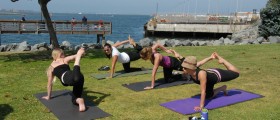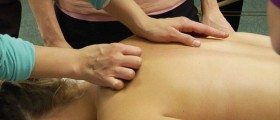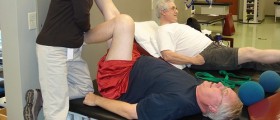Loading...
It seems to me that this is what we might be able to conclude…
First off I’ll just say that of course, sure, it’s always gonna be a possibility something goes horribly wrong in any situation/case but from the feedback in the comments it looks like it’s most likely if you’re experiencing similar issues that it’s probably nothing you should be giving yourself a heart attack over with stress and concern and fear.
Also, i see weight concerns brought up a few times but i can say am very underweight (most i doubt would say in “a healthy way”) but anyway i would argue that being overweight itself is probably not directly related as a cause or the like, but indirectly it seems like it might have an effect on the experience/level of pain and probably i think we can confidently rule it out as a solution.
But, i myself have still been very inactive these last several years with very little exercise or really even walking around and i think that this is directly related to the issue and important to note.
I like the suggestion of exercise as a solution because even though it’s been outside of my routine and not particularly something i want to do or enjoy going to do it’s still something that is easily within my own control, it’s free and if it can possibly benefit my relief from pain what else could you ask for? + will be a benefit to my overall health (if i ever actually follow through and do it).
Also for most of my life i have always typically had a very very fast metabolism but i have been taking medications that are very well known to severely effect the slowing the GI tract.
When the symptoms started getting noticeable, and then later, started getting bad and on those occasions it bothers me the most I’ve noticed it’s coincided with times of dehydration, physical tension (which is usually, -related to- & -usually develops more of-, -the mental stress), also long periods of inactivity (especially like at times when I’ve needed to catch up on sleep and sometimes end up sleeping 24 hours+ after 2 or3 days of very little sleep)
Massage and stretching also seem to both also be valid effective treatments for the pain and also the tightness aspect; whether individually or along with exercise (i think just a bit less effective than exercise though, at least in my limited experience), oh and diet of course
So my conclusion is that the digestion/ trapped gas theory seems spot on to be the best bet but i would also add to that. Cuz i think that it’s probably a symptom which exists, persists and progresses as a result of inactivity and stress and possibly more difficult to deal with if your digestion moves slowly and/or your not eating nutritious and balanced food..
So with that in mind, i think the easiest thing to do about it would just be to go in semi-regularly ( I’m thinking once twice a month. I should probably aim higher.) to go get a relaxing message and then ideally follow up or previously have a sit in a sauna session. Maybe even followed by a light swim/ least a few laps just to get things moving in the right direction.
But of course, i imagine the best thing to do would be an overall change of lifestyle to include working in somehow regular(or irregular) bodily movements, i might take up, i think that they call that exercise or something, (i might take up flailing) oh and fiber.
Maybe another decent option is daily mental clarity and focus/ a little meditation-type-/stress-relief-type/remembering what’s truely important and followed up with a “let go of other people’s baggage” and also a solid “decision not to keep picking it up because i won’t let them make it be mine”, and then finally a series of stretches to wake up and really get your prepared in the morning for the crazyzracy world out there. some light&gentle™️ self- rib-rub™️ massage at nights whenever it’s all said and done at night before bed.
Let me know what you think
Loading...
Loading...
Not sure how old this article is. You did a great job describing the feeling. I’ve had this for over 10 years. You never know when it’s going to happen. There are so many opinions on this but haven’t found a single answer. Hope you find an answer. Will save this and I still continue for the reason
Loading...
Hi, guys.
Our expert, Chris Smith, updated his answer with these data:
There are several possible causes for a knotting up sensation in the upper body below the rib cage area, including:
-
Muscle tension or spasms: This can be caused by poor posture, stress, overuse of muscles, or injury.
-
Acid reflux: Acid reflux can cause a burning sensation in the chest and upper abdomen, as well as a feeling of tightness or knotting up.
-
Gallbladder problems: Gallstones or inflammation of the gallbladder can cause pain and tightness in the upper abdomen.
-
Peptic ulcer disease: This is a condition where there is a sore or hole in the lining of the stomach or small intestine, which can cause a burning or gnawing pain in the upper abdomen.
-
Pancreatitis: Inflammation of the pancreas can cause pain and tightness in the upper abdomen, often accompanied by nausea and vomiting.
-
Anxiety: Anxiety can cause physical symptoms, including tightness or knotting up in the chest and upper abdomen.
As for treatment, here are some general suggestions that may be helpful:
-
Practice relaxation techniques: Deep breathing exercises, meditation, and yoga can help reduce stress and muscle tension.
-
Massage: A gentle massage in the affected area can help ease muscle tension and relax the body.
-
Heat therapy: Applying a heating pad or taking a warm bath can help relieve muscle tension and discomfort.
-
Stretching: Gentle stretching exercises can help loosen up tight muscles and relieve tension.
-
Over-the-counter pain relievers: Pain relievers such as acetaminophen or ibuprofen may provide some relief for mild to moderate discomfort.
-
Addressing digestive issues: If the sensation is related to digestive issues, such as acid reflux or indigestion, modifying your diet and taking medication prescribed by your doctor may help alleviate the symptoms.
-
Consult your doctor: If the sensation persists or is accompanied by other symptoms such as chest pain, shortness of breath, or dizziness, it's important to consult your doctor to rule out any underlying medical conditions.
It's important to note that these suggestions are general and may not be appropriate for all cases. Always consult your doctor if you are experiencing persistent or severe symptoms.
Loading...

















